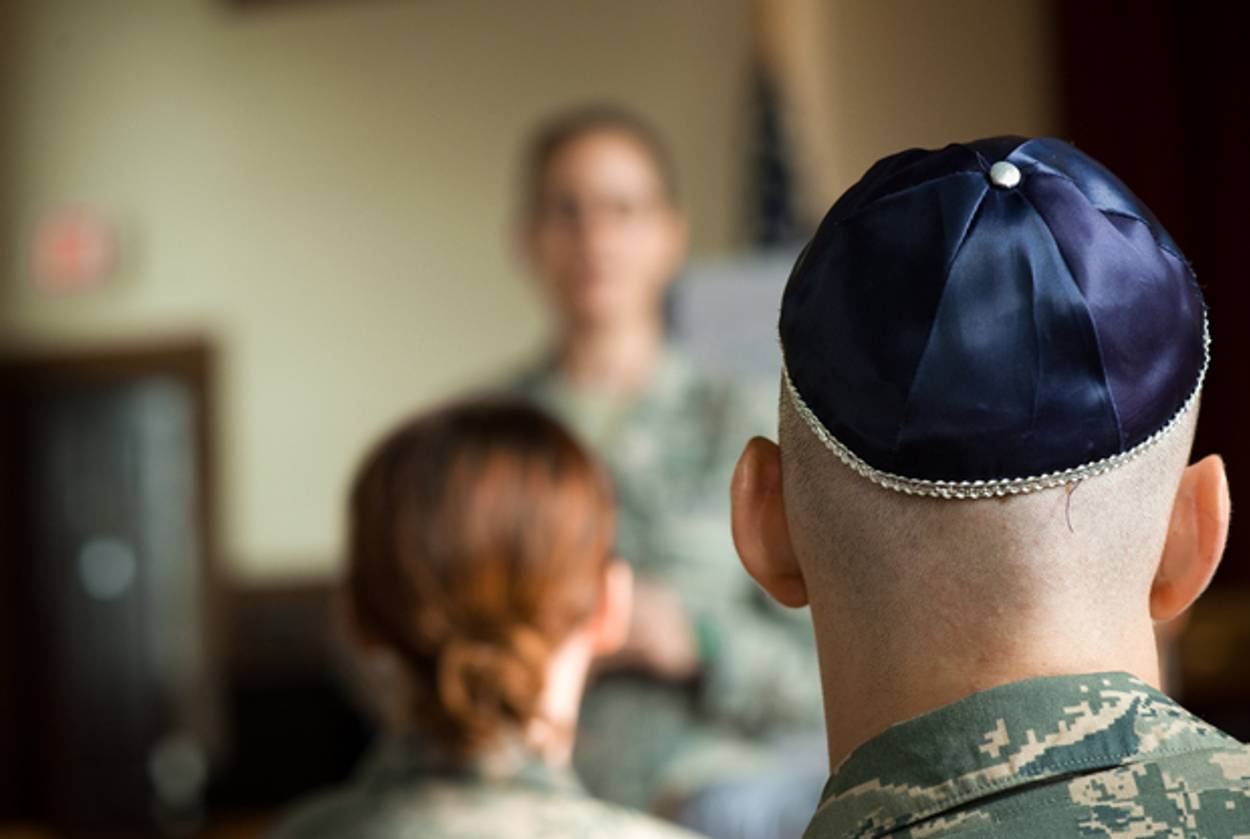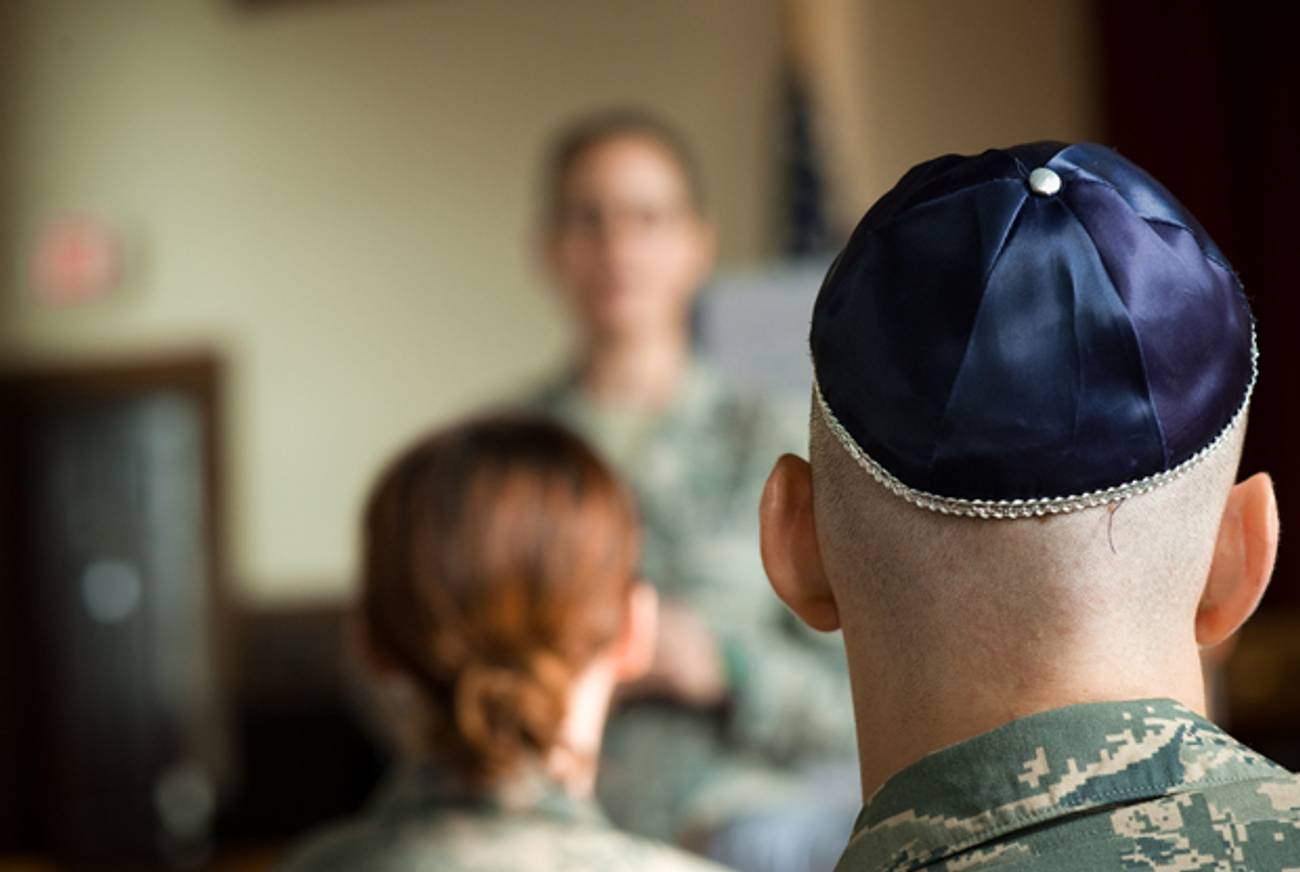Davening for Doughnuts
Most soldiers in Basic Training attend services just for the snacks. The lemonade was good, but it was the Torah that kept me coming back.




I never attended services in the civilian world. But all that changed when I joined the Army.
It didn’t start as a religious awakening. During Basic Training, I thought that going to services would be a good opportunity to get away from the drill sergeants for a while, and maybe I’d even get a nap out of it. Maybe not the purest of intentions, but priorities are different in Basic.
All religious services at Fort Benning, in Columbus, Ga., are held on Sundays. That first Sunday, there were four of us, out of a company of 220, who said we would like to attend Jewish services. I walked into the Regimental Chapel, where I dutifully picked up a Siddur and took a seat in a pew toward the back. I was surprised by how many people were there—maybe 50, drawn from all the companies on base—and I was fairly certain the majority weren’t actually Jewish. They all looked to me like hardened combat veterans, even though they’d probably only been in a few weeks longer than I had, and never left Fort Benning. Some of them, including the non-Jews, wore ACU yarmulkes, which I’d later learn were very popular and in high demand. One soldier was even wearing a tallit.
There was nothing particularly memorable about the service itself. But the enthusiastic chaplain, a major, clearly enjoyed having us there, even the ones who were nodding off. We read a prayer for the men and women serving in the armed forces. There was some call and response, in English and in Hebrew, and most people seemed like they’d done this before. Not me.
The chaplain read to us the weekly Torah portion and then talked about how it related to us, as Basic Trainees who had signed up for the military in a time of war. Raised by my nonobservant Jewish mother, I had never read the Torah, gotten bar mitzvahed, or given any thought as to what it might mean to actually be Jewish. If someone asked, I would say I was Jewish, but there was no real meaning behind it.
At that Sunday service, for the first time, I started to understand. The chaplain’s words lifted my spirits. I remembered why I had joined in the first place, to the shock of my family and friends. My mother is slightly to the left of Keith Olbermann, and no one in my social circle was in the military. I’d never doubted my decision, but right then, after just four days in the Army, I needed that reassurance that this was a higher calling.
After the service we filed into the parking lot, where some kind, older veterans had set up picnic tables with lemonade and doughnuts. Now I understood why the service was so popular, even with non-Jews who could have opted to go to one of the other services offered at the same time: Mormon, Catholic, Protestant, Muslim, or Buddhist. Meals at Basic Training consist of a couple panicked moments of shoveling as much food as possible, in any combination, into your mouth before a drill sergeant tells you that you’re done. Maybe it was because I actually had time to chew before swallowing, but the doughnut I had that day was the best I’d ever had.
Before boarding the bus that would take me back to my barracks, I worked up the courage to approach the chaplain and asked if he had a copy of the Torah I could borrow. Your only two reading options at Basic are military books or religious books, and I was looking to expand my choices. The chaplain gave me a small book of the Torah that fit perfectly into my ACU’s pocket, gave me some general words of encouragement, and sent me on my way.
Whenever I got the chance, I’d read Torah. If I wasn’t writing a letter home or cleaning my weapon or doing pushups, I was lying on my bunk reading Torah. I wrote home about my new studies, and a friend was kind enough to print articles from Tablet and My Jewish Learning and mail them to me. These articles made me stronger. Not just spiritually, as I learned about my faith, but physically: My platoon had a policy that for every letter you received in the mail, you owed the drill sergeants 10 pushups. Between articles about Judaism and the letters my girlfriend’s third-grade students were sending me, I was knocking out 100 pushups easy, every mail call.
Eventually, word leaked out to the rest of the company about the doughnuts and lemonade, and by the end of Basic, 65 soldiers from my company alone were marching to services on Sunday. At the end of every service, the chaplain would ask if anyone was about to graduate, and those who were would stand up and say where they were headed to next. The chaplain would offer congratulations and a prayer, and those of us still pushing through Basic would dream about when it would be us standing up, saying where our next duty station was.
After more than nine weeks, I finished Basic in July 2010. I still have the Torah the chaplain gave me that first Sunday. I kept it with me through every bit of training I did after Basic: Officer Candidate School, Infantry Basic Officer Leadership Course, Ranger School, and finally Airborne School. It’s always there when I need it. It’s seen better days—the cover is battered, some of the pages are dog-eared—but all in all, it’s held up remarkably well through patrols, battle drills, and marches.
Last week, I deployed to Afghanistan, with my Torah safely packed in my assault pack. My Forward Operating Base has Jewish services at 1830 hours, every Friday. I don’t know if they’ll serve lemonade and doughnuts this time, but either way, I’ll be there.
U.S. Army 2nd Lt. Jake Kohlman is currently deployed with the 82nd Airborne Division to Afghanistan.
U.S. Army 2nd Lt. Jake Kohlman is currently deployed with the 82nd Airborne Division to Afghanistan.